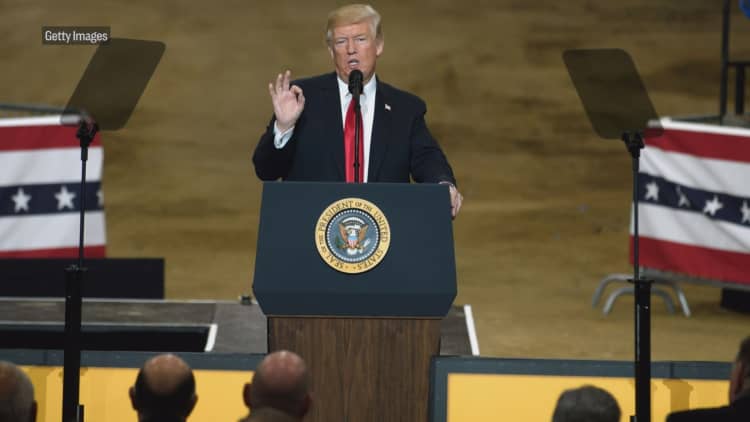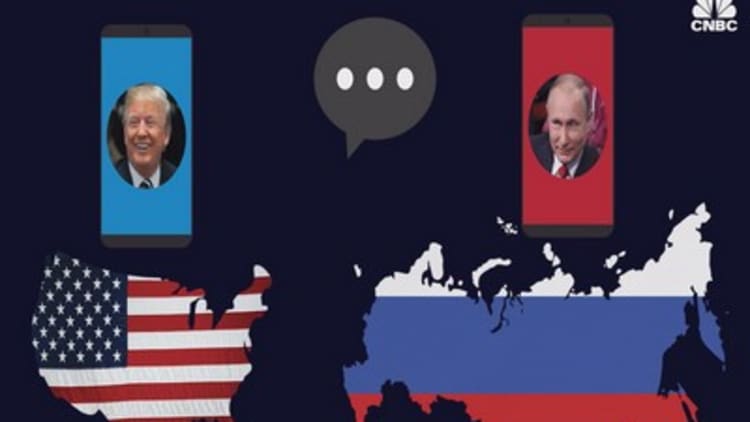
President Donald Trump on Monday laid out two rationales that he could use to justify granting himself a pardon in the event that he is ever charged with a federal crime.
The arguments, made on Twitter, were accompanied by Trump's assertion that he has "the absolute right to PARDON myself." They were the latest signs that Trump is considering drastic action in order to protect himself from special counsel Robert Mueller's Russia investigation.
Disguised as a hypothetical situation, Trump's first rationale for pardoning himself was simply that he didn't do anything wrong.
Trump's lawyers have told media outlets that the president is convinced that neither he nor anyone on his campaign ever colluded with Russia. Trump's lawyers also say he does not believe he has obstructed justice while in office. Trump himself has repeatedly denied that he colluded with Russia or obstructed an investigation of Moscow's meddling.
The question of whether or not either of these assertions is true, however, is immaterial to the president's arguments about pardons. By Trump's logic, if he didn't do anything wrong, then any accusation that he did is, by definition, a false accusation.
Moreover, the accusations Trump is talking about would almost certainly stem from the special counsel, which Trump regularly accuses of acting as an arm of the so-called deep state, a conspiracy orchestrated by his political enemies.
This means that any accusation would not only be false, it would also have been concocted by Trump's enemies in the Justice Department — bureaucrats willing to use the power of the state not to advance justice, but to destroy Trump.
By this reasoning, Trump's situation would be similar to that of conservative author Dinesh D'Souza, who pleaded guilty to federal campaign finance violations. Trump granted D'Souza a pardon just last week.
In addition to the D'Souza model of using his presidential pardon powers to remedy an "unfair" prosecution of himself, Trump on Monday suggested a second rationale by which he would be justified in granting himself a pardon in the Mueller probe.
A variation on Trump's first argument, his second claim went further, arguing that the special counsel's office was not merely corrupted by politics, it was out-and-out unconstitutional. (Trump's second tweet was originally posted at 9:07 a.m. Monday. It was later deleted and reposted at 10:01 a.m., this time with the correct spelling of "counsel.")
It's unclear precisely why Trump believes the probe violates the Constitution, but on Sunday, he tweeted snippets of an interview on Fox News Channel with Mark Penn, a former Hillary Clinton campaign strategist who has argued that Deputy Attorney General Rod Rosenstein and Mueller had conflicts of interest that should have precluded their involvement in an investigation of the Trump campaign.
Penn has also publicly questioned whether the broad investigative authority granted to the special counsel by the Justice Department is in keeping with what the framers of the Constitution intended.
Setting aside Trump's widely debunked claim that the Clinton campaign conspired with Russia, the president's argument that the special counsel is unconstitutional is a relatively new one for Trump. More often, he has claimed that the probe is a hoax, a witch hunt or a conspiracy.
Yet by aping Penn's argument in his tweet, the president appeared to be trying to bring a new level of legal gravitas to his tirades against the Mueller investigation.
If the special counsel's probe were indeed unconstitutional, Trump could easily argue that this means any evidence uncovered during the probe, and any charges based on that evidence, would be unconstitutional, too.
If the entire Mueller investigation is the equivalent of one, big unconstitutional search, as Trump appeared to claim on Monday, then pardoning individuals targeted by the probe, including himself, would be tantamount to righting a wrong and to protecting constitutional rights.
The White House didn't immediately respond to a request for comment on Trump's arguments.
WATCH: The Trump-Russia ties hiding in plain sight



